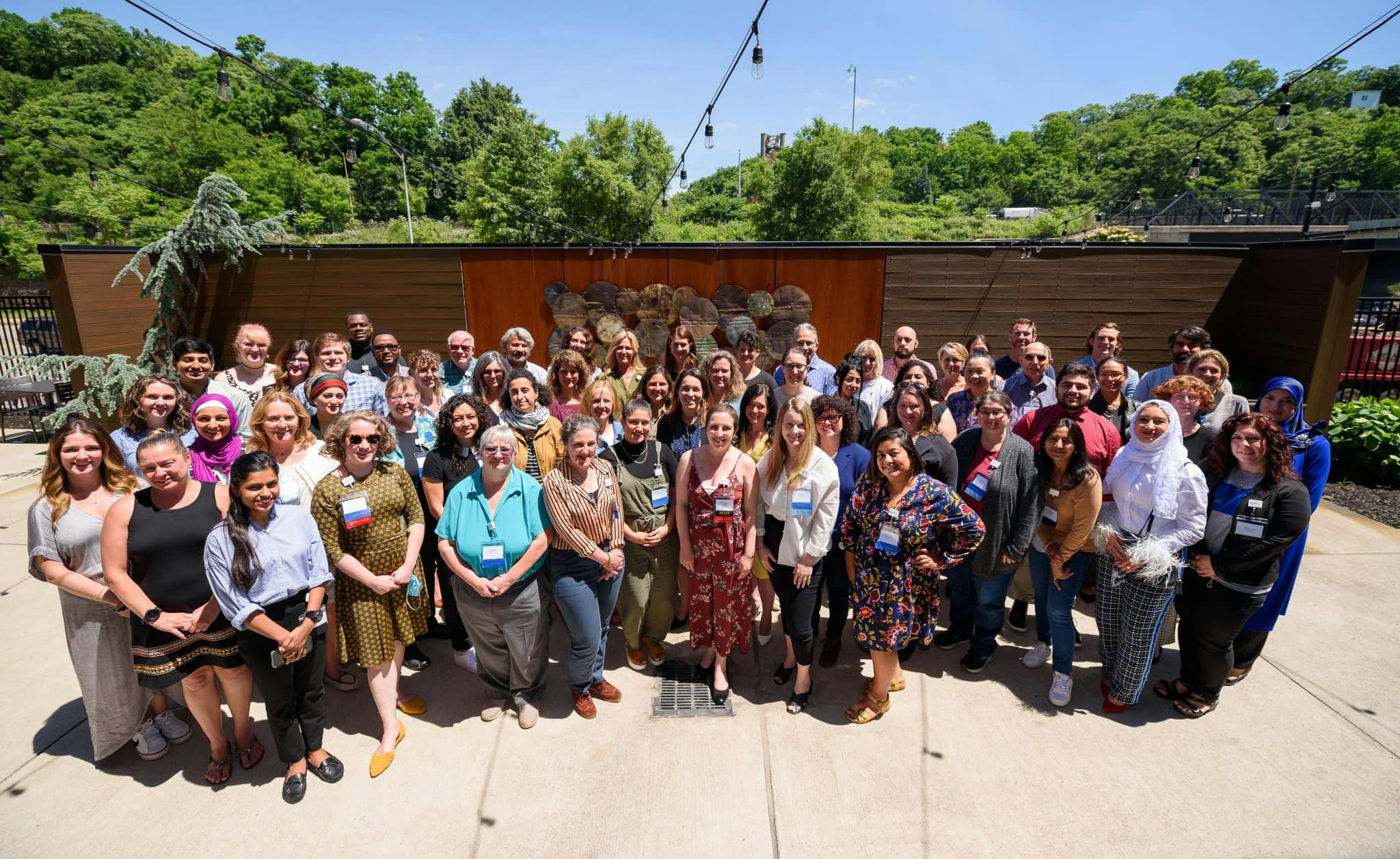WASHINGTON, D.C.
Thank you. (Applause.)
It’s an honor to be with you. I know that this is called the First Spouses event – not the First Ladies event – because there are a few men in the audience whose wives are more famous and more popular than they are. (Laughter.) I am one. (Laughter.) And rightly so. And I suspect President Obama would say the same thing. And so to both Michelle and Laura, I thank you very much for the great example and dignity you brought to the Office of First Lady.
I want to thank the African First Spouses who have joined us, some of whom I got to know when I was President. And it’s great to see friends again.
I also want to give a shout-out to our dear daughter, Barbara. There’s not many things that convince me to come back to Washington. (Laughter.) The First Ladies Summit of course is one. The other is to be able to dine with our dear daughter, who is a fabulous young woman making a big difference in global health around the world. I love you, baby. (Applause.)
It was an honor to see Dr. Biden again. I’m pleased to see Cherie Blair. It’s good to see you, Cherie. Please give my old pal my best. (Laughter.) He’s retired like I am. (Laughter.) Margaret Spellings, who was Secretary of Education when I was President, is doing a fabulous job at the Bush Institute. And if there are Members of Congress here, thank you for coming. If not, why not? (Laughter.)
I also want to thank Lisa Carty and Ambassador Deb Birx, the co-chairs of Pink Ribbon Red Ribbon. I thank you for your exceptional work on behalf of African women. I appreciate our founding partners. Michel Sidibe, UNAIDS. Thank you, Michel. Appreciate you being here. And Judy Salerno, the President and CEO of Susan G. Komen.
I’ve got a little more time on my hands these days. Surprisingly to some, painting. (Laughter.) But that doesn’t cause me not to have enthusiasm for the future. And as the father of two wonderful girls, and now the grandfather of the world’s smartest granddaughter (laughter), I’m more concerned about the future, not less.
Through the Bush Institute, Laura and I are engaged in issues that defined our time in the White House. And throughout many of our Institute’s priorities and proposals is woven one theme: The success of any nation is impossible without the political participation, the economic empowerment, the education, and health of women.
A decade ago the health emergency for women – and for everyone – was an uncontrolled AIDS pandemic in parts of Africa. Some of you probably have family stories of tragedy and loss. But together we have witnessed one of the brighter chapters in the human story. A combination of global resources and local courage has demonstrated two points: Disease can be defeated. And people living with AIDS refuse to be defeated. They are holding jobs, raising crops, starting small businesses, raising children, and contributing each day to Africa’s success.
The American commitment to the fight against global AIDS has reached across political divisions and two administrations. Thanks to PEPFAR, the Global Fund, and the rising commitments and resources of African governments, more than 9 million men, women, and children are on AIDS treatment in sub-Saharan Africa. (Applause.) A generation on the verge of being lost has been found. Life expectancy is up. Health care systems have grown stronger. Many more people in their most productive years – from their 20s to their 40s – are contributing to Africa’s economic growth. And many of the First Ladies, First Spouses, have led efforts to end mother-to-child transmission – the first, and necessary step in creating an AIDS-free generation.
We started the battle against AIDS with a broad, emergency response and there was really no alternative. But the great need and hope at this stage of the fight is to focus our efforts and resources. Better data, better treatment options, and better prevention approaches allow health officials to reach and help the highest-risk regions and groups. Applied with clear goals and accountability, this saturation approach presents an amazing opportunity: the beginning of the end of AIDS. It also requires something from the rest of us. It is impossible to direct help where it is needed most when any group is targeted for legal discrimination and stigma. Compassion and tolerance are important medicines. (Applause.)
One group that requires our particular attention is women and girls. We know that young women are particularly vulnerable to HIV/AIDS – because they are particularly vulnerable to poverty and violence. And women with HIV are four to five times more likely to develop cervical cancer, because their bodies have a reduced ability to fight infections such as HPV. This fatal link between HIV and cervical cancer can be broken. It is our job to break it.
Taken together, cervical and breast cancers are the number one killer of women in Africa – diseases still surrounded by stigma and ignorance. And the suffering spreads across generations. When a mother dies young, her children are less likely to be healthy and educated, and more likely to die young as well. One of the best ways to help children is to help their mothers live to raise them.
Three years ago, the Bush Institute launched Pink Ribbon Red Ribbon, which as Laura described is a public-private partnership that combats women’s cancers with a simple commitment: People living with AIDS should not be dying from preventable and treatable diseases. By bringing together a broad partnership of government, corporations, foundations, and multilateral organizations, we set out to raise awareness, screen high-risk populations, provide HPV vaccinations, and treat those with lesions through simple, low-cost methods. We work to lift the shadow of stigma from the cancers that target women. Our goal was not to build a bureaucracy, but to build a broad, shared, practical commitment. And we took the PEPFAR approach as our model: we work to show an idea can work, to increase capacity, and to bring it to scale.
And in the three countries where Pink Ribbon Red ribbon started work – in Zambia, Botswana, and Tanzania – we’re seeing results. More than 100,000 women have thus far been screened for cervical and breast cancer. (Applause.) The First Lady of Zambia, Dr. Christine Kaseba, has been a champion, fighting against false rumors about the HPV vaccine – something that needs to be done here in America as well. (Applause.) Mama Kikwete, the First Lady of Tanzania, has been a great advocate and led the mobilization for mass screenings. (Applause.) First Spouses are leading the way, and all of us thank you for doing…really what you should be doing. (Laughter.)
Laura and I have seen the outcome firsthand. The last two summers, we spent time in Kabwe and Livingstone, Zambia, helping refurbish and reopen health clinics. I was in charge of the painting. (Laughter.) She was in charge of going over the spots I missed. (Laughter.) She had a lot of work cut out for her. But in my defense, I was beginning to study the impressionist movement. (Laughter.)
Whenever we want an example of kindness and hospitality, we always think about the Zambian people. (Applause.) Besides dancing with the women, here’s what I remember most. (Laugher.) By the way, it was forgettable dancing. (Laughter.) The women were nervous at first, nervous to be screened. But then they became joyous. Joyous to know that people cared about them. Joyous to know that their government wanted them to be healthy.
So far in 2013, the Zambian partners, the people of Zambia, have screened 43,000 women for cervical cancer. About a third of those tested positive for pre-cancerous or cancerous cervical cells. In other words, the screening was a matter of survival. I know the process can be seen as intimidating. But it’s truly a source of life and hope. And by the way, for the First Ladies: if you’re worried about your husband’s political future, taking care of women is good politics. (Laughter and Applause.)
Many share the work and credit of Pink Ribbon Red Ribbon. I want to thank our organizing members, PEPFAR, Susan G. Komen, UNAIDS, for demonstrating a moral commitment to universal human dignity that unites our country. I deeply appreciate our generous corporate and foundation members, many of whom are here, for their consistent dedication to women and girls in Africa.
It’s also a partnership with the countries in which we operate. These programs survive and thrive when local leaders take ownership and commit their resources, as we’ve seen in Tanzania, Zambia, and Botswana. Our goal is to create working models – proven partnerships – that additional countries, over time, can expand and incorporate into their own national plans. This has always been my approach to development: Partnership, not paternalism. And so I’m pleased to announce today that Pink Ribbon Red Ribbon is expanding to include two additional partner countries: Namibia and Ethiopia. (Applause.)
I am particularly grateful to GlaxoSmithKline, Bristol-Myers Squibb Foundation, GE, IAEA, and the American Cancer Society for their willingness to work in those two countries by providing education, vaccinations, screening, and treatment.
Today we’re going to announce as well a distinguished group of advocates called Pink Ribbon Red Ribbon ambassadors who are going to help us all take this important message across the continent of Africa. Bethlehem, Strive, Gertrude, and Isha – I would say their last names but I am confident I’d mispronounce them (Laughter) – are here today. You just met Strive, he’s an awesome guy by the way. And we’re thrilled that they’re our ambassadors.
But the truth of the matter is the First Ladies ought to be ambassadors as well. The First Spouses have a chance to impact the future of your country in remarkable ways. You can champion national politics. You can help build political will. You can save women from cancer. You’re uniquely positioned.
And here’s one of the problems we have – people die of stigma. There’s too many people not being treated because of some false rumors. And the First Ladies, while stigma may seem like an unbreachable wall, you’ve got to realize it’s really made of glass. And through your leadership it can be broken by being outspoken, and by being honest, and by being compassionate for the sake of mothers and grandmothers.
It takes a lot to get me to leave Dallas. This conference surely is one reason why I came. I mean, this is awesome. This is great. And we thank the White House. I thank the Bush Institute and their team for helping prepare this important conference.
I’m now going to invite Mrs. Roman, the First Lady of Ethiopia, and the First Lady of Namibia, Mrs. Pohamba, to come and join me on the stage. God bless you all. (Applause.)
END




























